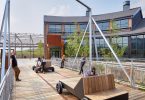The Rachel Carson EcoVillage, named for legendary environmentalist and Chatham alumna, Rachel Carson ’29, has received approval for its Final Land Development Plan on Chatham’s Eden Hall Campus. With 20 of 35 units already pre-sold, planning and design for the community continue toward its goal of breaking ground in the fall of 2022 with move-in planned for summer 2023.
The Rachel Carson EcoVillage will consist of 35 multi-generational ecologically-designed private dwellings ranging in size from studios to two-bedroom units that can be finished with up to four bedrooms, with a shared commons building. The compact neighborhood will be located on less than five acres of Chatham University’s Eden Hall Campus, a richly diverse environment of nearly 400 acres of fields and woods that currently houses a variety of solar and geothermal energy installations, a certified organic farm, and highly energy efficient buildings that advance Chatham’s Falk School of Sustainability & Environment studies in sustainability, food studies, and environmental science. EcoVillage members will participate in and benefit from the many ecologically-based projects and practices at Eden Hall, as well as the academic life of the university. EcoVillage members will contribute regular volunteer hours to improve the ecological integrity of the campus, while reducing their reliance on traditional food networks and supply chains, which are vulnerable to repeated disruptions.
The Rachel Carson EcoVillage has founding members that include educators, engineers, artists, and other creators and professionals. To date, the group is comprised of families, singles of all ages, and couples. Many future EcoVillagers have roots in western Pennsylvania, while others hail from as far away as Maine, Arizona, Wisconsin, and Florida. The EcoVillage is based on the model of cohousing, a concept created in Denmark in the 1970s that embodies practices in social and ecological sustainability. There are now nearly two hundred intentional living communities throughout the U.S., such as Ecovillage Ithaca, founded in 1994, and Takoma Village, which has been operating in Washington DC since 1998.
“This inspiring endeavor brings the transformative words and beliefs of Rachel Carson to life in a beautiful and practical way,” said Chatham University President David Finegold. “Chatham University is proud to work with a community that is so passionate about becoming responsible stewards of our environment that they are willing to rethink their entire way of life in order to make their impact on our planet more beneficial and sustainable.”
As Stefani Danes, an architect and Carnegie Mellon University professor who is helping guide the project, explains: “Both Chatham and the EcoVillage see learning as a valuable part of our partnership. We talk about it as a ‘case study’ because our intent is to share what we learn. Several Chatham students are developing thesis projects based on the EcoVillage, and we are supporting their work. We are also working with colleagues at Duquesne University and Carnegie Mellon in Pittsburgh to create EcoVillage-related projects making the community a living lab in the truest sense.”
To learn more about the project or participate in the next online introductory presentation, visit https://www.rachelcarsonEcoVillage.org/.







